Today we added to our growing pool of publications on aspects of labour migration in Nepal. The Open Access journal BMC Health Services Research published our paper ‘Accessing health services in India: experiences of seasonal migrants returning to Nepal’ [1]. The paper explores the experiences of returnee Nepali migrants with regard to accessing healthcare and the perspectives of stakeholders in the government, support organizations, and health providers working with migrant workers in India. The paper concludes that Nepali migrants experience difficulties in accessing healthcare in India. Hence the authors recommend partnerships between the Nepali and Indian governments, migrant support organizations and relevant stakeholders such as healthcare providers, government agencies and employers should be strengthened so that this vulnerable population can access the healthcare to which they are entitled.
Three of the authors are based at BU (Dr. Nirmal Aryal, Dr. Pramod Regmi & Prof. Edwin van Teijlingen), whilst Dr. Pratik Adhikary is a BU PhD graduate and Prof. Padam Simkhada, from the University of Huddersfield, is BU Visiting Faculty.This qualitative paper is part of a larger International Organization for Migration research project on ‘Health vulnerabilities of the cross-border migrants from Nepal’ [2].
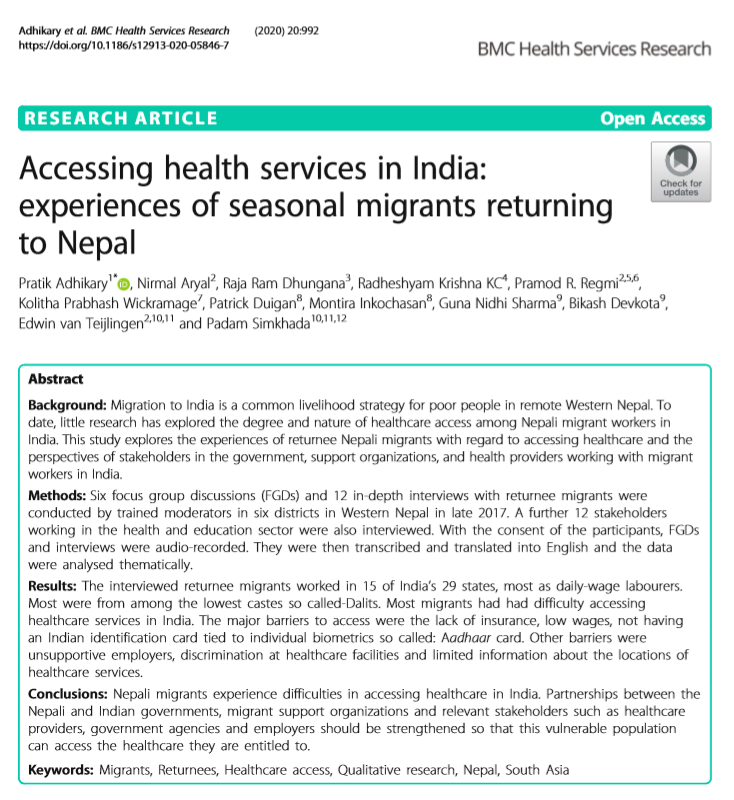 The authors to acknowledge the continuous support from Green Tara Nepal (GTN) during the field work. This Open Access paper from this FHSS team of researchers on migration and health research related to Nepal is the 19th paper in total on the topic [3-19].
The authors to acknowledge the continuous support from Green Tara Nepal (GTN) during the field work. This Open Access paper from this FHSS team of researchers on migration and health research related to Nepal is the 19th paper in total on the topic [3-19].

References:
- Adhikary, P., Aryal, N., Dhungana, R.R., KC, R.K., Regmi, P.R., Wickramage, K.P., Duigan, P., Inkochasan, M., Sharma, G.N., Devkota, B., van Teijlingen, E., Simkhada, P. (2020) Accessing health services in India: experiences of seasonal migrants returning to Nepal. BMC Health Services Research 20, 992. https://doi.org/10.1186/s12913-020-05846-7
- IOM [International Organization for Migration]. (2019) Health vulnerabilities of cross-border migrants from Nepal. Kathmandu: International Organization for Migration.
- Aryal, N., Regmi, P.R., van Teijlingen, E., Trenoweth, S., Adhikary, P., Simkhada, P. (2020) The Impact of Spousal Migration on the Mental Health of Nepali Women: A Cross-Sectional Study, International Journal of Environmental Research & Public Health 17(4), 1292; https://doi.org/10.3390/ijerph1704129
- Regmi, P., Aryal, N., van Teijlingen, E., Adhikary, P. (2020) Nepali migrant workers and the need for pre-departure training on mental health: a qualitative study, Journal of Immigrant & Minority Health 22, 973–981.
- Adhikary, P. van Teijlingen, E. (2020) Support networks in the Middle East & Malaysia: A qualitative study of Nepali returnee migrants’ experiences, International Journal of Occupational Safety & Health (IJOSH), 9(2): 31-35.
- Simkhada, B., Sah, R.K., Mercel-Sanca, A., van Teijlingen, E., Bhurtyal, Y.M., Regmi, P. (2020) Health and Wellbeing of the Nepali population in the UK: Perceptions and experiences of health and social care utilisation, Journal of Immigrant & Minority Health (accepted).
- Regmi, P., van Teijlingen, E., Mahato, P., Aryal, N., Jadhav, N., Simkhada, P., Syed Zahiruddin, Q., Gaidhane, A., (2019) The health of Nepali migrants in India: A qualitative study of lifestyles and risks, Journal of Environmental Research & Public Health 16(19), 3655; doi:10.3390/ijerph16193655.
- Dhungana, R.R., Aryal, N, Adhikary, P., KC, R., Regmi, P.R., Devkota, B., Sharma, G.N., Wickramage, K., van Teijlingen, E., Simkhada, P. (2019) Psychological morbidity in Nepali cross-border migrants in India: A community-based cross-sectional, BMC Public Health 19:1534 https://bmcpublichealth.biomedcentral.com/articles/10.1186/s12889-019-7881-z
- Aryal, N., Regmi, P.R., van Teijlingen, E., Simkhada, P., Mahato, P. (2019) Adolescents left behind by migrant workers: a call for community-based mental health interventions in Nepal. WHO South East Asia Journal of Public Health 8(1): 38-41.
- Aryal, N., Regmi, P.R., Faller, E.M,, van Teijlingen, E., Khoon, C.C., Pereira, A., Simkhada, P. (2019) ‘Sudden cardiac death and kidney health related problems among Nepali migrant workers in Malaysia’ Nepal Journal of Epidemiology 9(3): 755-758. https://www.nepjol.info/index.php/NJE/article/view/25805
- Adhikary P, van Teijlingen E., Keen S. (2019) Workplace accidents among Nepali male workers in the Middle East and Malaysia: A qualitative study, Journal of Immigrant & Minority Health 21(5): 1115–1122. https://link.springer.com/article/10.1007/s10903-018-0801-y
- Simkhada, P.P., van Teijlingen, E.R., Gurung, M., Wasti, S. (2018) A survey of health problems of Nepalese female migrants workers in the Middle-East & Malaysia, BMC International Health & Human Rights 18(4): 1-7. http://rdcu.be/E3Ro
- Adhikary P, Sheppard, Z., Keen S., van Teijlingen E. (2018) Health and well-being of Nepalese migrant workers abroad, International Journal of Migration, Health & Social Care 14(1): 96-105. https://doi.org/10.1108/IJMHSC-12-2015-0052
- Adhikary, P, Sheppard, Z., Keen, S., van Teijlingen, E. (2017) Risky work: accidents among Nepalese migrant workers in Malaysia, Qatar & Saudi Arabia, Health Prospect 16(2): 3-10.
- Simkhada, P.P., Regmi, P.R., van Teijlingen, E., Aryal, N. (2017) Identifying the gaps in Nepalese migrant workers’ health and well-being: A review of the literature, Journal of Travel Medicine 24 (4): 1-9.
- Aryal, N., Regmi, P.R., van Teijlingen, E., Simkhada, P., Adhikary, P., Bhatta, Y.K.D., Mann, S. (2016) Injury and Mortality in Young Nepalese Migrant Workers: A Call for Public Health Action. Asian-Pacific Journal of Public Health 28(8): 703-705.
- Sapkota, T., Simkhada, P., van Teijlingen, E. (2014) Nepalese health workers’ migration to United Kingdom: A qualitative study. Health Science Journal 8(1):57-74.
- Adhikary P, Keen S and van Teijlingen E (2011). Health Issues among Nepalese migrant workers in the Middle East. Health Science Journal.5 (3):169-i75 DOI: 2-s2.0-79960420128.
- Adhikary, P., Simkhada, P.P., van Teijlingen E., Raja, AE. (2008) Health & Lifestyle of Nepalese Migrants in the UK, BMC International Health & Human Rights 8(6). Web address: www.biomedcentral.com/1472-698X/8/6




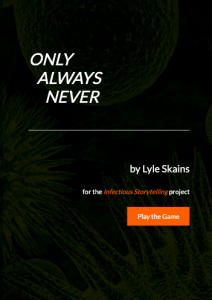
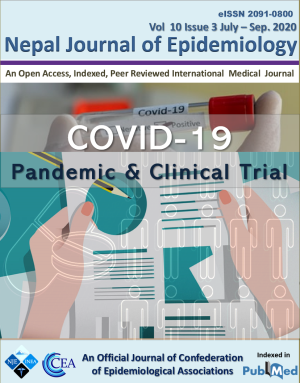
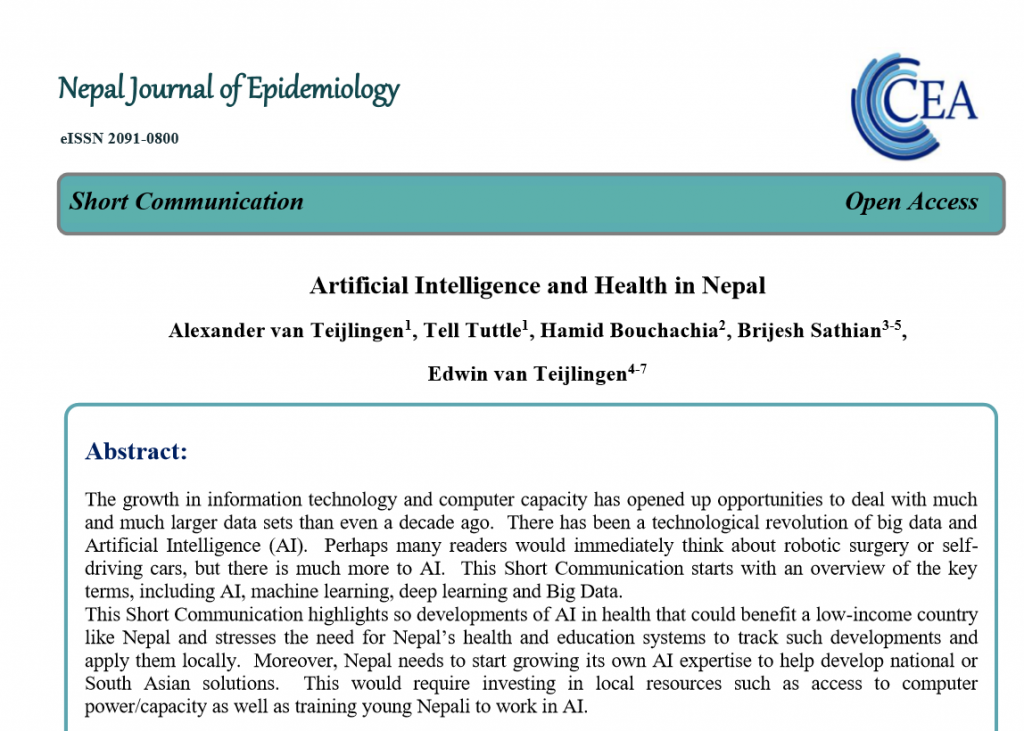
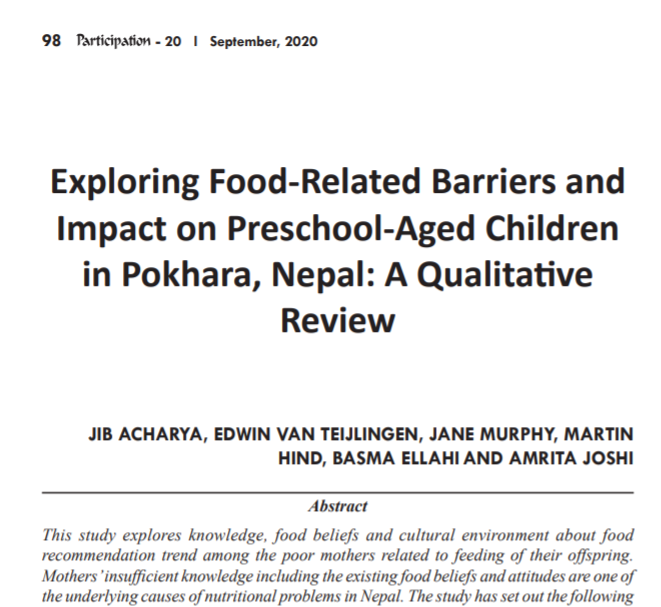
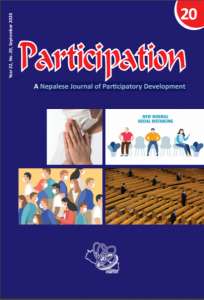

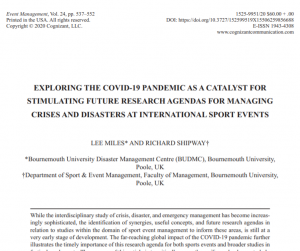
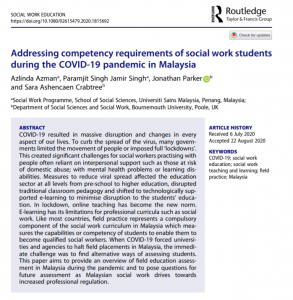
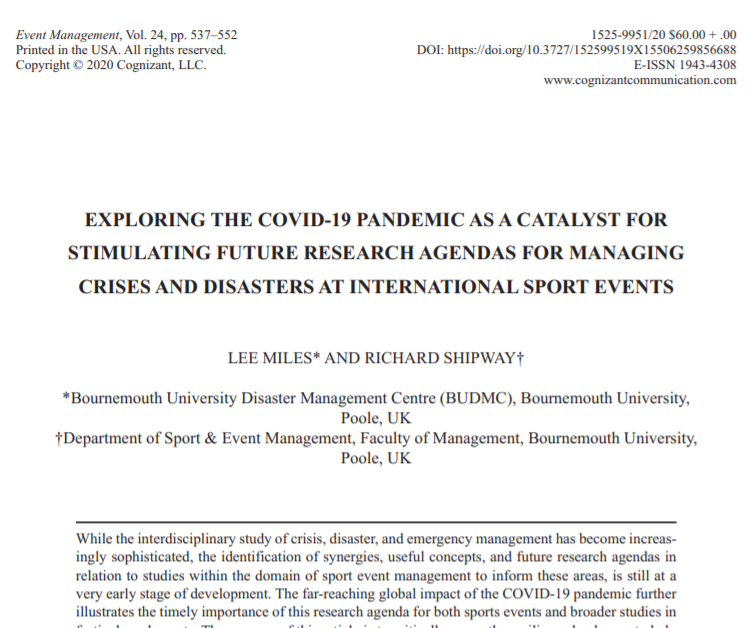
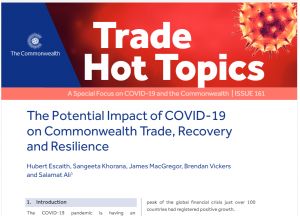
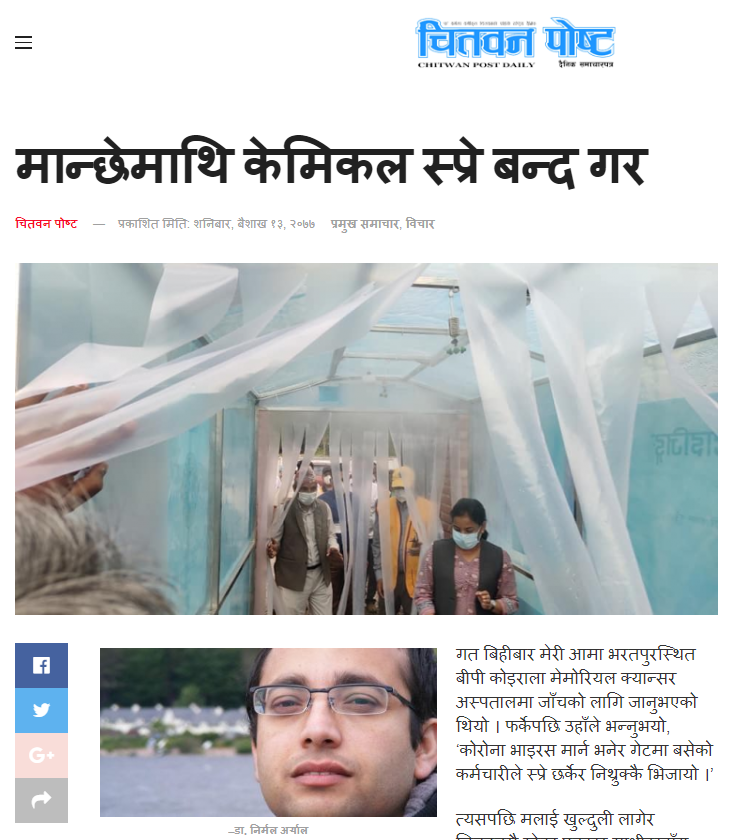
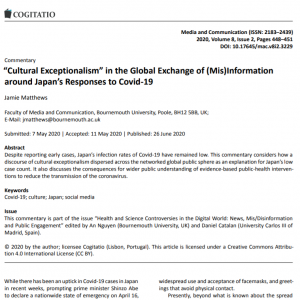

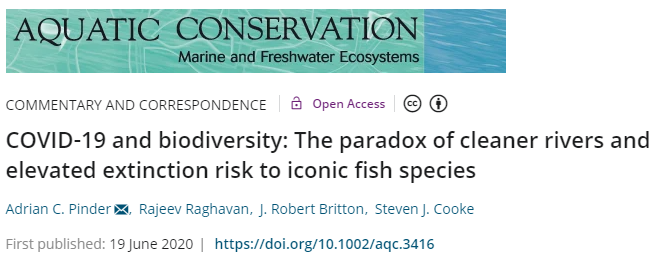
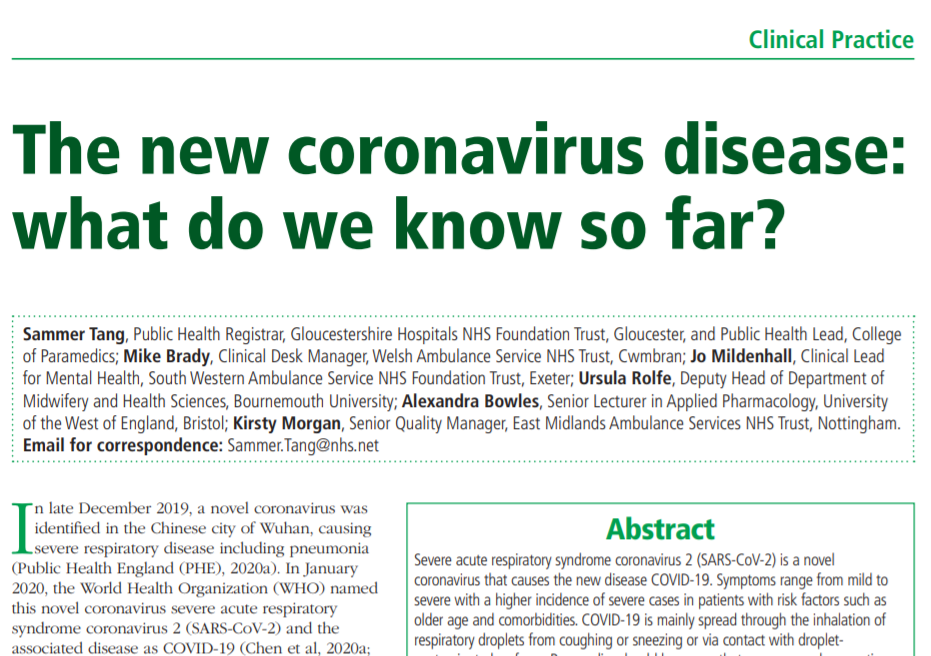
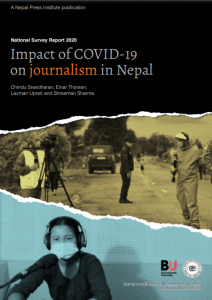
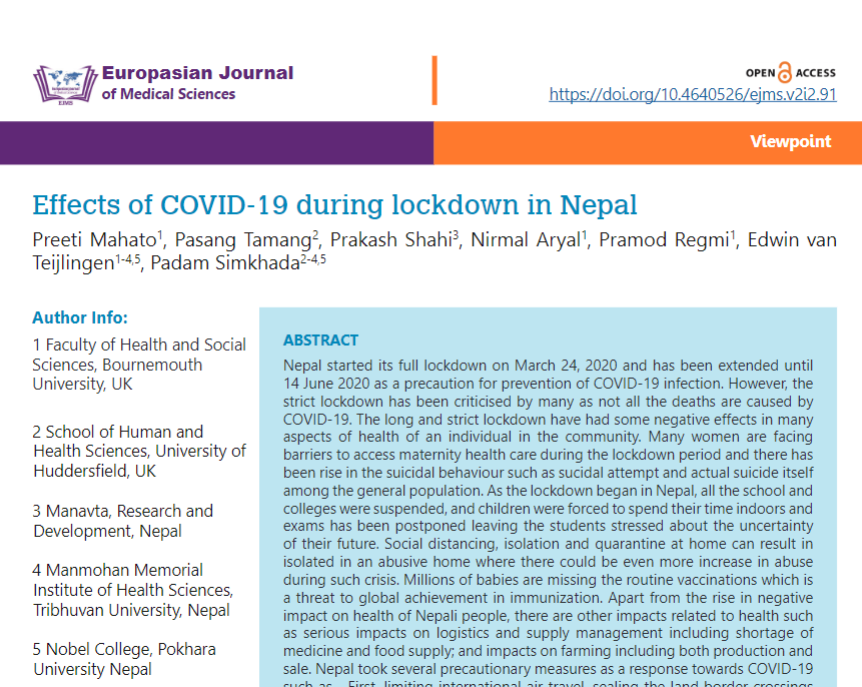
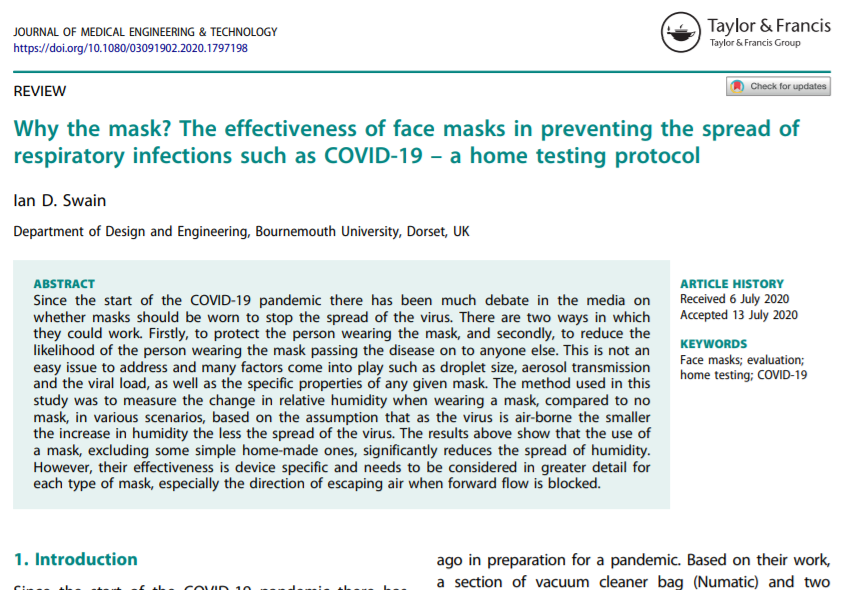

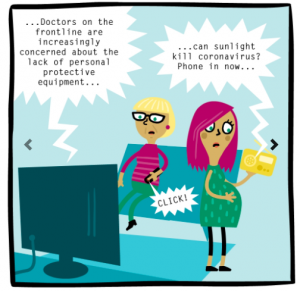
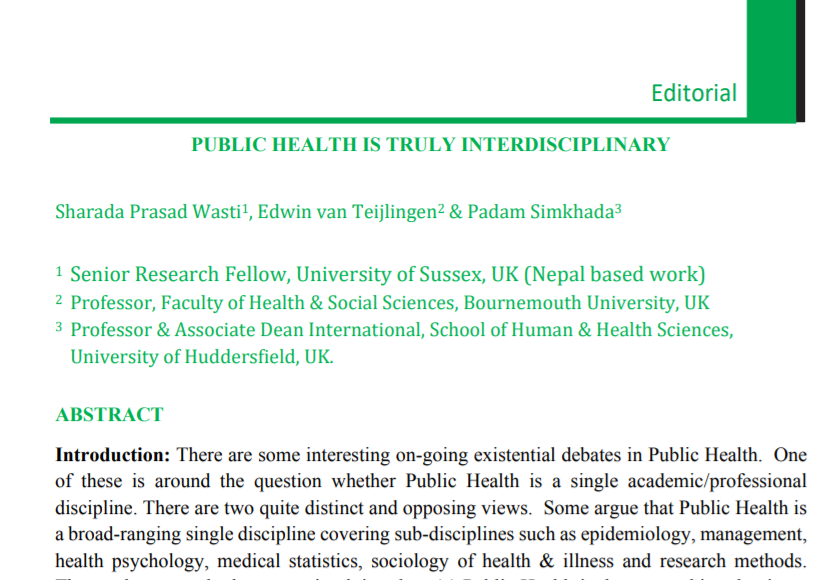
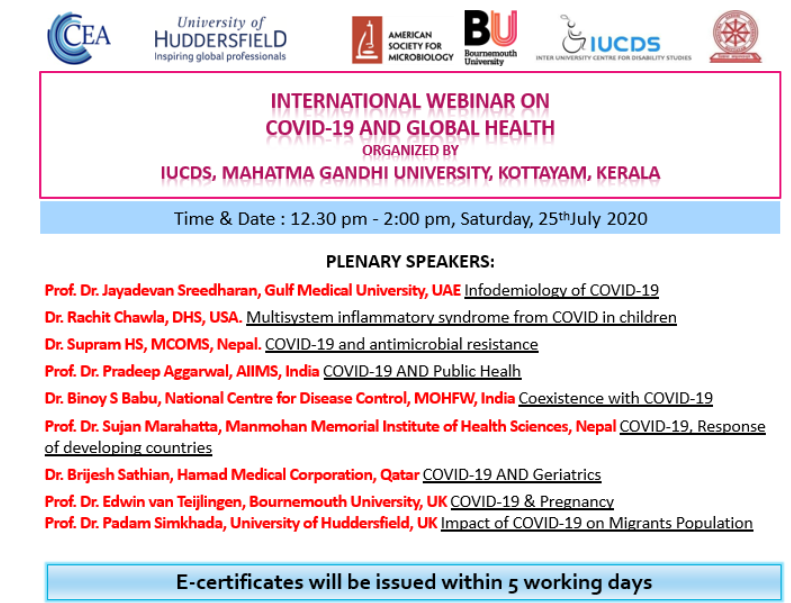














 Upcoming opportunities for PGRs – collaborate externally
Upcoming opportunities for PGRs – collaborate externally BU involved in new MRF dissemination grant
BU involved in new MRF dissemination grant New COVID-19 publication
New COVID-19 publication MSCA Postdoctoral Fellowships 2024
MSCA Postdoctoral Fellowships 2024 Horizon Europe News – December 2023
Horizon Europe News – December 2023